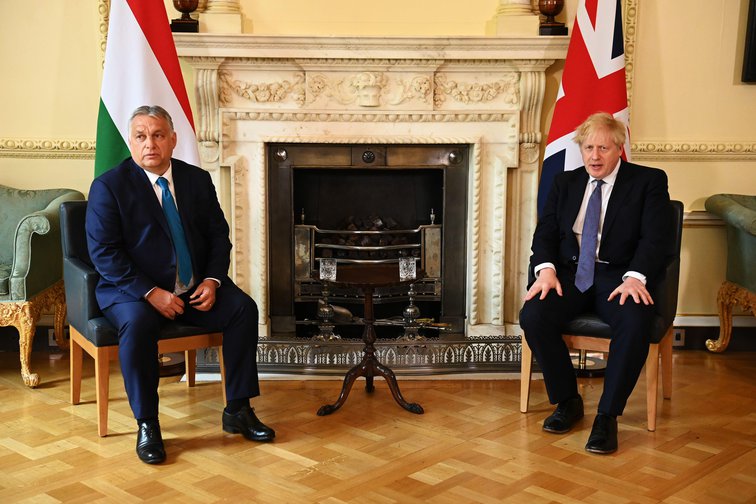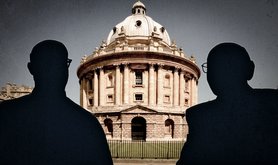
Johnson’s UK, Bolsonaro’s Brazil and Orbán’s Hungary: peas in a state-captured pod
State capture happens when narrow interest groups take control of public policy, buying influence to rewrite the rules. There are signs it’s happening in Britain

Yesterday morning, I started writing a piece asking whether the UK is a captured state after watching Conservative MPs vote to rip up the rules on parliamentary standards to protect their colleague, Owen Paterson.
Boris Johnson’s government has pulled back, slightly, from its threat to replace the independent anti-sleaze watchdog with a panel dominated by Tory MPs. And while Paterson may have since stepped down as an MP, the question remains: is the UK a state captured by vested interests?
State capture is different to classic bribery or corruption. An example of classic bribery is a property developer paying a bribe to get permission to build on a piece of land – a one-off benefit that breaks the existing rules.
State capture is when the property developer influences a government minister to change the rules about what kind of property can be built on what kind of land – thereafter, the developer has access to a whole new landscape of opportunity.
Get dark money out of UK politics!
Sign our petition to put pressure on the government to tighten electoral laws and shine more light on political donations. We need to know who is giving what to our political parties.
It’s a type of systematic corruption where narrow interest groups take control of the institutions and processes that make public policy, buying influence not just to disregard the rules but also to rewrite the rules.
That means that state capture has much deeper and longer-term consequences. If a group can change the rules, then it not only gains an advantage but also bakes that advantage in. State capture alters the rules by which we all live and any behaviour within the new rules is legal, not subject to challenge.
We tend to associate state capture with post-Soviet and post-colonial transitions. Think oligarchs in Russia and oil barons in Nigeria. But more recently, we’ve seen a new form of capture emerge in more mature democracies – and some worrying signs of it in the UK.
Time to sound the alarm
After Wednesday’s government-led vote to overturn the decision of the established parliamentary standards system and replace it with some hastily assembled partisan outfit, I felt it was time to sound the alarm.
Around the world, the new manifestation of state capture is led by politicians not business people. They get into power through elections but then radically change the rules of the game to entrench their power.
If a group can change the rules, then it not only gains an advantage but also bakes that advantage in
Viktor Orbán in Hungary, Recep Tayyip Erdogan in Turkey, Narendra Modi in India, and Jair Bolsonaro in Brazil. They were all democratically elected, but have then used their power to rewrite the rules in ways that make it more difficult to hold them to account, challenge their decisions, or vote them out of office. Donald Trump tried to do the same.
The playbook of state capture has some classic techniques. First, weaken the judiciary’s capacity to hold your government to account. Orbán appointed a crony as prosecutor, changed the way judges were appointed and restricted the constitutional court’s jurisdiction. The Johnson government has openly questioned the impartiality of judges and called for political oversight of judicial appointments, and plans a new mechanism that would allow it to ‘correct’ court judgements that ministers believe are incorrect.
Second, silence the media. Orbán restructured the media regulator, appointed a crony to head it, and channelled state-advertising contracts to crony outlets. The UK government’s ongoing attack on the BBC, a highly trusted public service broadcaster, and its efforts to install a crony as media regulator look frighteningly similar.
Third, change the rules for getting elected. Orbán redrew electoral boundaries, granted votes to huge diaspora communities outside Hungary’s borders and used COVID emergency powers to curb public funding for opposition-led municipalities. The UK government is, in the Elections Bill, seeking to remove the Electoral Commission’s power to prosecute those who break election rules – opening the door to abuse of campaign finance rules.
Related story
And yesterday’s vote was not the first time the UK government has shown disregard for the decisions of bodies who regulate conduct in public office. The prime minister ignored the independent adviser on ministerial interests when it was found that Priti Patel had breached the ministerial code. He disregarded the House of Lords appointments commission when it recommended against conferring a peerage on Tory donor Peter Cruddas. He has failed to take action concerning a number of other allegations of misconduct relating to his cabinet.
Kangaroo court
Then on Wednesday in Parliament, the government initiated a vote to rubbish the findings of Parliament’s established and internationally respected system for regulating parliamentary conduct.
In doing so, it also overturned a rule that has been a key tenet of British democracy since 1695: that elected members of Parliament must not engage in paid advocacy. The effect of the vote seemed to be that the UK no longer banned members of Parliament from lobbying on behalf of paying clients. And it no longer had a functioning system for judging whether members of Parliament have breached the code of conduct.
The vote removed the keystone from the norm architecture of British standards – and it looked like democracy was about to crumble. My pessimism peaked afterwards as some members of the government gloried in their ‘achievement’ and continued to bash away at the system by, for example, insisting on the resignation of the embattled parliamentary commissioner on standards, a respected professional who has performed her public role with care and precision.
I was about to conclude that the UK had indeed slipped the embrace of its democratic history and was heading into the depths of state capture.
Then an alert appeared on my phone: Johnson had U-turned. The vote on Paterson’s suspension will go ahead. The proposed kangaroo court for reviewing his case and the parliamentary standards system will be scrapped.
What happened?
It seems that those long-established norms meant something after all. The country fought back. Ordinary people wrote to their MPs by the thousands. The few Tories who had voted against the motion were lauded and championed.
And this morning, the chair of the Committee on Standards in Public Life, a former head of MI5, gave a speech in which he called the move “an extraordinary proposal…deeply at odds with the best traditions of British democracy.” Ouch. Allowing for British understatement, that is a sharp slap in the face of the Johnson administration.
On Wednesday, it seemed as if the keystone of British democracy had been removed. By Thursday morning, it had been put back. But with so many attempts to chip away at other parts of the system ongoing, the structure still looks worryingly fragile.
Read more
Get our weekly email





Comments
We encourage anyone to comment, please consult the oD commenting guidelines if you have any questions.